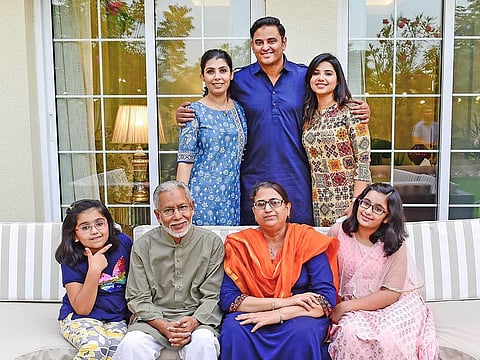‘Family time is a Ramadan blessing’
The Rahman family, from India, stays awake at night to share moments together

Dubai resident Atif Rahman doesn’t sleep at night during Ramadan; he spends the time socialising with family members who also stay up until dawn.
Ramadan is a time to draw closer to God and to people, starting with the family, says Rahman, 40, who hails from the Indian city of Patna in Bihar state.
Rahman sleeps after suhour at dawn for five hours or so, leaves for work and returns before sunset.
As the time for iftar nears, at dusk, the Rahman family comes together in myriad ways at their villa in Dubai’s Meadows community.
Naturally, a lot of the interactions are taking place sporadically in the kitchen (it’s nearly time for iftar), where Rahman’s wife Aaliya is putting the final touches to ‘chana dal vada’ (deep-fried patties made of lentils and Indian spices). The snack is made every day at their home in Ramadan, and Rahman has been enjoying the home recipe since childhood.
Rahman, who is the director and partner of Danube Properties, said his childhood also conjures memories of his grandmother, who embodied the spirit of sharing in Ramadan.
Rahman says: “I still remember how, back in India, my grandmother used to cook iftar and send it to the entire police camp which used to reside in our colony. That was my daily routine, to go with our help and the people who would help my grandmother prepare iftar and take it to the police camp. And they would love it. They were not Muslim or fasting, but they used to really look forward to iftar.”
The daily arrival of iftar in Ramadan, Rahman says, is a special time.
“It’s the best time to ask God for forgiveness and blessing. That’s why we try to maintain silence for a few minutes at iftar; otherwise we are an absolutely talkative family. We cannot stay silent that long.”
Rahman; his mother Roksana and father Mohammad; Aaliya; daughters Ammara, 10, and Anabia, 6; take their seats around the dinner table as iftar signals the end of the fast. Rahman’s sister-in-law Shusmita Narayan is also joining them.
The spread is just right — not too much food, but enough to satiate the cravings. There is the ‘chana dal vada’ (of course), bread pakoda (potato-stuffed fritters), fruit salad with seasoning, custard, dates, and a few other treats. It’s all washed down with some water and a rosy, sugary syrup called Rooh Afza, a household brand in India and Pakistan.
Everything tastes fresh, wholesome, filling and homemade — because it is.
There is a silence, softly lifted by the murmurs of supplication. After the brief sunset prayer, the family gravitates around the table once more. The main dish of the day — chicken curry with cumin rice — sits pretty as everyone helps themselves to some of it.
There will be plenty more to come after the night prayers of Ramadan, topped with tea and savoured over long conversations. These are moments Rahman’s parents cherish, making it a tradition to spend all Ramadans together.
His mom Roksana says: “We are visiting from India for observing Ramadan together. It really brings out the family spirit.”
Aaliya also enjoys, apart from the spiritual character of the special month, the time “we get to spend together as family and friends”.
“On a daily basis, we’re together and meeting friends. We not only eat together, but pray together as well. Ramadan is a season of social bonding,” Aaliya says.
After the Taraweeh prayers, with many hours still left to go until suhour, what is the agenda for the night?
Rahman says: “We sit around the table and share memories, recall the moments we have spent. We plan a few things for the future. You talk about so many things. It’s a mix of everything — going out, dining, doing things together. Family time is one of the blessings of Ramadan.”
RECIPE
Chana Dal Vada (Bengal gram fried patties)
Soak one cup of chana dal overnight
Grind the dal in the morning
Add one chopped onion
Add one chopped green chilli
Add some coriander leaves
Add salt to taste
Add ¼ tablespoon turmeric powder
Add ½ tablespoon cumin powder
Add around two spoons of rice powder (to give a bit of crisp to the vada)
Add a little red chilli powder
Mix it all up together
Deep fry until golden brown


